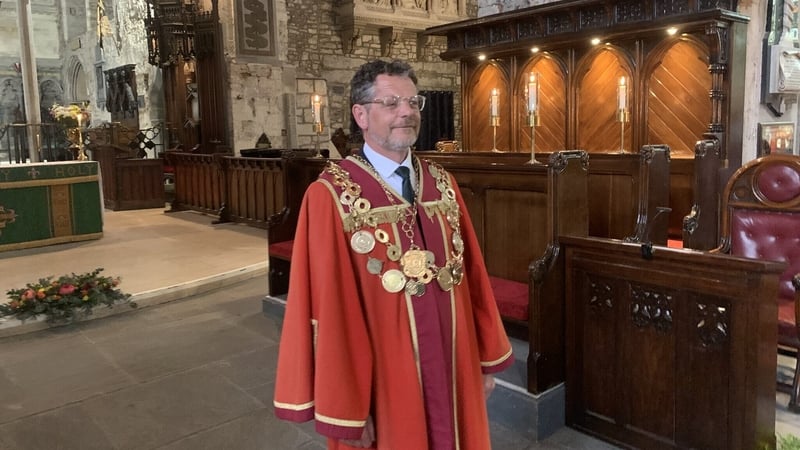John Moran made history when he became the first directly elected mayor in the country last year.
An Independent candidate with an ambitious programme for the five-year term, he topped the poll with 18,308 votes, some 5,000 more than his nearest challenger. It was a resounding personal endorsement for the first time candidate.
This week, the Mayor of Limerick told a conference examining the implications of a directly-elected mayor for Dublin that democracy must take its course.
“Ireland scores very well generally on integrity, but if you want to deliver on increased powers and increased autonomy at local government, we must be increasingly vigilant and lead on the best international standards, right across local government. Trust in our political system is at an all time low across the world, and we need to do what we can to rebuild that.”
With a mandate from the people of Limerick to shape the county’s future, Mayor Moran told The Week in Politics; “It’s hard to believe it’s almost a year gone. I know we set out a very ambitious programme and said we had 5 years to do it, and the clock is really ticking on that.”
The mayoral programme is still in the planning stage. It centres around three pillars – a livable city, a more prosperous Limerick, and a healthier Limerick.
Dr Maura Adshead is Professor of Politics at the University of Limerick, and she acknowledged that it is probably too early to assess the achievements of Mayor Moran one year into his five year term.
“There are lot of plans,” she said. “There’s a plan for the renovation of the Colbert Quarter. There’s a plan for more sustainability in transport. There are plans for modular housing and transition housing whilst we wait for longer term housing to be built, but again as I say at this stage, they are mostly plans.”

Labour TD Conor Sheehan was a candidate in the mayoral election and went on to secure the last seat in the general election in the Limerick City constituency. He said Mayor Moran’s first year has “generally been quite positive”.
“This role is a transformative role, it’s the first time we’ve done it anywhere in the country, and I think the mayor has brought great political focus in terms of where we are lacking in investment in Limerick”.
The mayor said the biggest challenge that he and all stakeholders have faced over the past 12 months, has been adapting to the change in local government that the new role brings.
“I think probably the change. I think for a lot of people, it’s a new role; How do we set up the new governance structures? How do we deal with the national government? I think for less than a year, we have made huge progress on that front.”
Deputy Sheehan believes that some councillors are working with the mayor, but others are not.
“I do think that some of the bigger political parties who stood candidates in the mayoral election are still quite embitted that maybe their candidate didn’t come through, and I think that, in many ways, disappointingly, at a local level coloured their engagement with the mayor,” the Labour TD said.
Mayor Moran is more diplomatic.
“I think there has been a bit of discussion out there, that the councillors are all against the mayor, and I think that’s very unfair on the councillors. I mean they are going through the same change that I am,” he said. “But it is really imporant that everybody’s voices are heard and that they feel involved.
“We have had councillors that have come forward that volunteered to work on some important issues for me but also for them like homelessness and addiction. The SME group is working well. We have a group working on the city centre revitalisation, and all of these are co-chaired by councillors,” he said.
Deputy Sheehan said, “We need to see the mayor and we need to see the councillors working as one voice for the betterment of Limerick to secure more funding and more investment for Limerick, and that will require a bit of give from the mayor and it will require a bit of give from Fianna Fail and Fine Gael councillors in particular.”

In the early days of his mayoralty, John Moran had to deal with the closure of the International Rugby Experience. “It was probably the first dossiers to land on my desk,” he said. The building that housed the museum had been donated to the council by the JP McManus charitable foundation.
Nick Rabbitts, journalist with the Limerick Leader said it was a big challenge for the mayor because Limerick is a sports mad city. “The mayor as part of his own budget offered €100,000 of his own budget to keep it open up to 2027,” Mr Rabbitts said. “Unfortunately the closure has taken place, but I think that was an example of perhaps the biggest challenge since he came into office and also a signal of what he can do with his office.”
“It was one of those problems which can be very hard to explain to people, where you can get a very generous capital gift, which is the building, but then you don’t have the money to do the running of the building. I am still hopeful,” Mayor Moran said. “We just need to keep a dialogue going. There are lots of other uses that can really work in a building like that. It’s such an amazing building in the city centre.”
Upfront with Katie Hannon hosted a televised debate between the candidates during the mayoral election, in which John Moran said he would solve the housing crisis in the county.
“In the build up to the election, he did say he wanted to solve the housing crisis in Limerick,” Mr Rabbitts said, “so I think the provision of housing is going to be a really big thing and I think is it something that he will be measured by.”
Smart Housing is a key part of the mayoral programme, which will see more modular housing to Limerick. The Mayor said, “We’re trying to get two ideas to meet in the middle, and this is going to need a bit of openness from government to allow us to do that. The first is to use modular housing in a way that hasn’t been done before, essentially 3 or 4 stories so that they are almost like modular apartments. If we put them into one neighbourhood we can put them into another neighbourhood in 20 years time, and move them around.”
Mayor Moran has also set money aside in his budget for a trial which will see derelict homes refurbished and rented to council tenants. Part of an allocation of €2.3m on housing is to go on a pilot project in Abbeyfeale.
If it is a success, the Limerick’s first citizen wants to expand it across all of the county.
“In Abbeyfeale, we’re buying derelict houses to keep them in state ownership and rent them to key workers and others that aren’t quite making the cut for social housing income thresholds. If we can get that model to work in Abbeyfeale as well as the smart homes, we can start to see maybe 1,000 or 2,000 of these ideally on time for the Ryder Cup so that we can have accommodation for the workers of the Ryder Cup, and when the Ryder Cup is over, they will become accommodation for people who want to work in Limerick.”
John Moran’s mayorality is a test bed for other counties. If it is to be a success, other counties will follow and directly elect their own mayor.
“Democracy ultimately has to take its course. While the challenge is significant, the experience of Limerick offers valuable lessons to Dublin,” Mayor Moran told the Dublin conference last week.
“The establishment of a directly elected mayor in Limerick was the result of a democratic process that involved the electoral in decision making – this participatory approach ensured that the changes reflected the will of the people.”



